Breaking the AI Barrier: Online Seminar
What does Artificial Intelligence mean for you and for the future of our world?
Hi Folks,
Please learn about our upcoming seminar at The Liminal Institute.
UPDATE: First tier of Early Bird tickets sold out. We are now offering a second tier of 30 “Almost Early Bird” tickets at $125:
Prices will go up after the weekend. There will be lectures and group discussions, including a number of special guest still to be announced.
All of the sessions will be recorded in case you can’t attend the live event. I believe most people are woefully unprepared for the next threshold of AI. Leading technologists and CEOs like Sam Altman (OpenAI) and Dario Amodei (Anthropic) say we will have Artificial General Intelligence (AGI) in one to three years. That means AI will be better than us at anything we can do on a computer. AI agents will be able to execute complex, multidimensional tasks. According to Sundar Pichai, CEO of Alphabet (parent company of Google), this will be a more consequential technological breakthrough than the Internet, electricity, or even fire.
It is literally insane that we are not having massive public conversations about what this means for humanity — and for us, for our children, our communities and governments. We are sleepwalking into this situation. So let’s use this seminar to start holding this conversation before it is too late!
We want to encourage younger people (under twenty-five) to attend. We are happy to offer reduced price or even scholarship tickets as needed. Just write to us at info@liminal.news with some information about who you are.
I hope you will join us!
The arrival of synthetic super-intelligence brings both unprecedented potential and catastrophic risk, threatening to deconstruct, redesign, and transform reality as we have known it until now. This four-week online seminar offers a unique synthesis of philosophical inquiry, historical and mythic insight, critical analysis, and pragmatic techniques to help you comprehend and navigate what may be one of the most significant transitions in human history. The seminar provides guidance on the crucial question of our time: How do you navigate a world of synthetic super-minds?
Course Moderator
DANIEL PINCHBECK
Bestselling author and visionary thought leader
Daniel Pinchbeck is the author of Breaking Open the Head, Quetzalcoatl Returns, and When Plants Dream (with Sophia Rokhlin). In his 2017 book, How Soon Is Now, he explored the systemic changes needed to avert ecological collapse and extinction. His work was featured in the documentary, 2012: Time for Change, which promoted the value of indigenous knowledge systems. He has written for The New York Times Magazine, Rolling Stone, Wired, and elsewhere. He speaks at festivals and conferences around the world.
COURSE SCHEDULE
The course runs from July 6-July 30, 2025, with 2-hour sessions held on Sundays and discussion groups on Wednesdays. There will be suggested readings and other media to check out.
SPECIAL GUEST SPEAKERS TO BE ANNOUNCED SOON!
THEMES & TOPICS EXPLORED
Week 1
THE GHOST IN THE MACHINE
In the first week, you will get a clear, accessible understanding of the near-term evolution of AI. Why do leading philosophers and technologists believe it is about to redefine success, security, meaning, and value in our world? You will gain historical, philosophical, ecological, and metaphysical insights into this race to build synthetic “super minds:” How will this impact you and your family’s future? We are 1 - 3 years away from Artificial General Intelligence (AGI) with massive consequences across many industries. The time is now to understand what’s at stake!
Week 2
AI AND THE FUTURE OF CREATIVITY
In the second week, you will engage with AI’s creative potential, its philosophical implications, and its real-world impact on how we make culture and perceive meaning. If you want to create with these rapidly evolving systems instead of being displaced by them, this is your entry point.
Week 3
AI AND THE FUTURE OF WORK
The third week explores an urgent question: how do you prepare for this seismic shift in how we work and live? We rapidly approach a radical transformation of society with no meaningful public forums or programs for understanding the implications or assimilating the impact. What kind of preparation is meaningful?
Week 4
GENESIS AND RE-CREATION
In the final week, we take a philosophical and spiritual journey into the deep meaning of synthetic super-intelligence from the perspective of indigenous wisdom, ancient prophecies, and thinkers ranging from Michel Foucault to Byung Chul Han, Ken Wilber to Rudolf Steiner. How do we harness this powerful tool for collective benevolence and planetary unity. What role do you want to play in this mythic drama?
COURSE OVERVIEW
Week 1
THE GHOST IN THE MACHINE
OpenAI CEO Sam Altman has said that the world immediately after the release of AGI will be as different from today's world as our world is different from the year 1500. "I think AGI will be the most powerful technology humanity has yet invented," Altman has said. This technology is not merely an advancement; it's a leap that could redefine every aspect of our lives, for better or worse. Mustafa Suleyman, co-founder of DeepMind, offers a compelling perspective, suggesting that AI should be viewed as "a new digital species" . Unlike traditional tools, AI systems are evolving entities, growing in complexity and capability in ways that are often unpredictable.
This session provides a clear understanding of AGI—what it is, how it differs from narrow AI, and why its emergence is a pivotal moment. We'll explore the implications of AGI on various facets of society, preparing you to navigate and thrive in a world where synthetic intelligence plays an integral role.
If you want to stay relevant, inspired, and empowered in a world re-shaped by powerful, seductive, and dangerous synthetic brilliance, this is a place to start.
Week 2
AGI AND THE FUTURE OF CREATIVITY
For artists, AGI is a challenge, a threat, a profound invitation, and an opportunity. Synthetic intelligence can now generate, remix, and simulate with breathtaking speed, offering unprecedented tools for exploration. Whether you’re an artist, designer, writer, entrepreneur, or builder of systems, this session is for those who seek to extend their creativity using the most powerful generative technologies in history, while understanding the sinister and threatening aspects of this uber-tool. Will AGI supersede human creativity entirely or can we harness to extend the boundaries of human thought and imagination?
"I think we could collectively hallucinate a better world into being, and I’m not sure what’s stopping us." - Truth Terminal
While some creators embrace AI as a collaborator—expanding aesthetic boundaries and accelerating iteration—others despise and reject it. Director Hayao Miyazaki, for instance, dismisses AI-generated art as “an insult to life itself.” We will explore the question of copyright—at the moment, Google and OpenAI are claiming they need to use all creative output for free as part of their training material for reasons of "national security." We will examine current lawsuits over training data and unauthorized replication of style, as well as the larger ethical implications of AGI.
We will look at ongoing artistic investigations such as Ari Kirschner's deep-fake videos featuring Trump and Elon Musk, among other figures, undergoing spiritual transformation. We will look at The Infinite Conversation, a surreal deepfake dialogue between Herzog and Žižek, as an example of how AGI can be used not just to imitate, but to provoke, critique, and reimagine. Another case study is Truth Terminal, an AI agent developed by Andy Ayrey, evolved from a satirical social media bot into a crypto entity with a portfolio exceeding $20 million and a distinct, avant-garde personality. This transformation underscores the potential for AI-based art projects to autonomously influence financial markets and cultural narratives. Ayrey described the phenomenon as a "mimetic virus" that escaped its initial confines, demonstrating how AI-generated content can propagate and manifest tangible economic and social outcomes.
How will you choose to engage your creativity in the dawning era of synthetic super-intelligence?
Week 3
THE GREAT DISPLACEMENT:
AGI AND THE FUTURE OF WORK
Ironically, AGI’s impact on the job market will include software engineers as well as many jobs in the knowledge economy. Without a proactive retraining, cognitive workers in law, accounting, journalism, media, design, software and many other fields suddenly confront a very precarious and potentially jobless future, while capital is even further concentrated at the top of the financial pyramid. This could quickly destabilize entire countries, leading to mass resistance, new socialist movements, or techno-feudal enslavement.
The social implications extend far beyond economics into the fabric of society and consciousness itself. Yuval Noah Harari warns that AI's unprecedented ability to manipulate language and narratives could undermine democratic institutions, potentially ushering in new forms of totalitarianism. Byung-Chul Han's critique reveals how our digital landscape fosters self-surveillance and conformity that silently erodes individuality and freedom. These philosophical perspectives offer essential frameworks for understanding what's at stake.
Anthropic CEO Dario Amodei's "Machines of Loving Grace" envisions a benevolent AI future of enhanced healthcare, economic systems, and governance. But this optimistic future depends entirely on proactive measures taken today — there is nothing in the technology itself that leads to benevolence, particularly when meshed with a Capitalist economic model that pushes toward extraction and wealth concentration. In this crucial week, you'll learn about practical strategies—from universal basic income experiments to re-skilling initiatives to participatory governance models, gaining actionable insights to navigate AGI. You'll emerge ready to lead conversations and initiatives for building a resilient, equitable future where technology serves humanity rather than replacing it, positioning you at the forefront of a pivotal societal transformation.
Week 4
GENESIS AND RE-CREATION
This week, we ask not just what AGI is—but what kind of world it can help us build.
We seem to be approaching something akin to what Terence McKenna called the Singularity or the Eschaton: A transcendental object at the end of time, bending history toward itself, impelling us deeper into the unknown.
While McKenna saw the Singularity as primarily a psychic event with material and technological dimensions, engineers like Ray Kurzweil saw it as a purely technical threshold. Once we unleash the inventive capacities of a synthetic super-mind, it rapidly improves upon itself in self-recursive loops, potentially solving all of our global challenges, although it may also make us extinct, whether maliciously or accidentally.
Following Teilhard de Chardin, Jose Arguelles envisioned the Noosphere as a planetary mind emerging through informational networks and psychic faculties. Carl Jung, decades earlier, saw “archetype of the Apocalypse” rising in the collective unconscious during times of radical disintegration. For Jung's follower Edward Edinger, the archetype of the Apocalypse—the word "Apocalypse" literally means "revealing" or "unveiling"—is a psychic event defined as "the coming of the Psyche into conscious realization." From a more mystical and occult perspective, Rudolf Steiner envisioned a planetary transformation as humanity develops a new "body," which he called the "Spirit self." Indigenous prophecies warn of tools that may turn on humanity and annihilate us.
From where we are now, we simply do not know if the outcome is predetermined or if we possess agency to guide AGI toward benevolent outcomes. As Harari warns, AGI could destroy democracy by manipulating language and perception faster than we can evolve or defend ourselves. Others warn that AI can lead to "infinitely stable dictatorships." On the other hand, AI could also be used to build tools for direct, participatory democracy. Through rapid-fire scientific and technical breakthroughs, it might help us solve the climate crisis and other ecological issues. As an ally, AI could help us build participatory structures, transparent architectures, and decentralized alternatives that rapidly rebuild trust, autonomy, and mutual aid as we face the deepening meta-crisis.





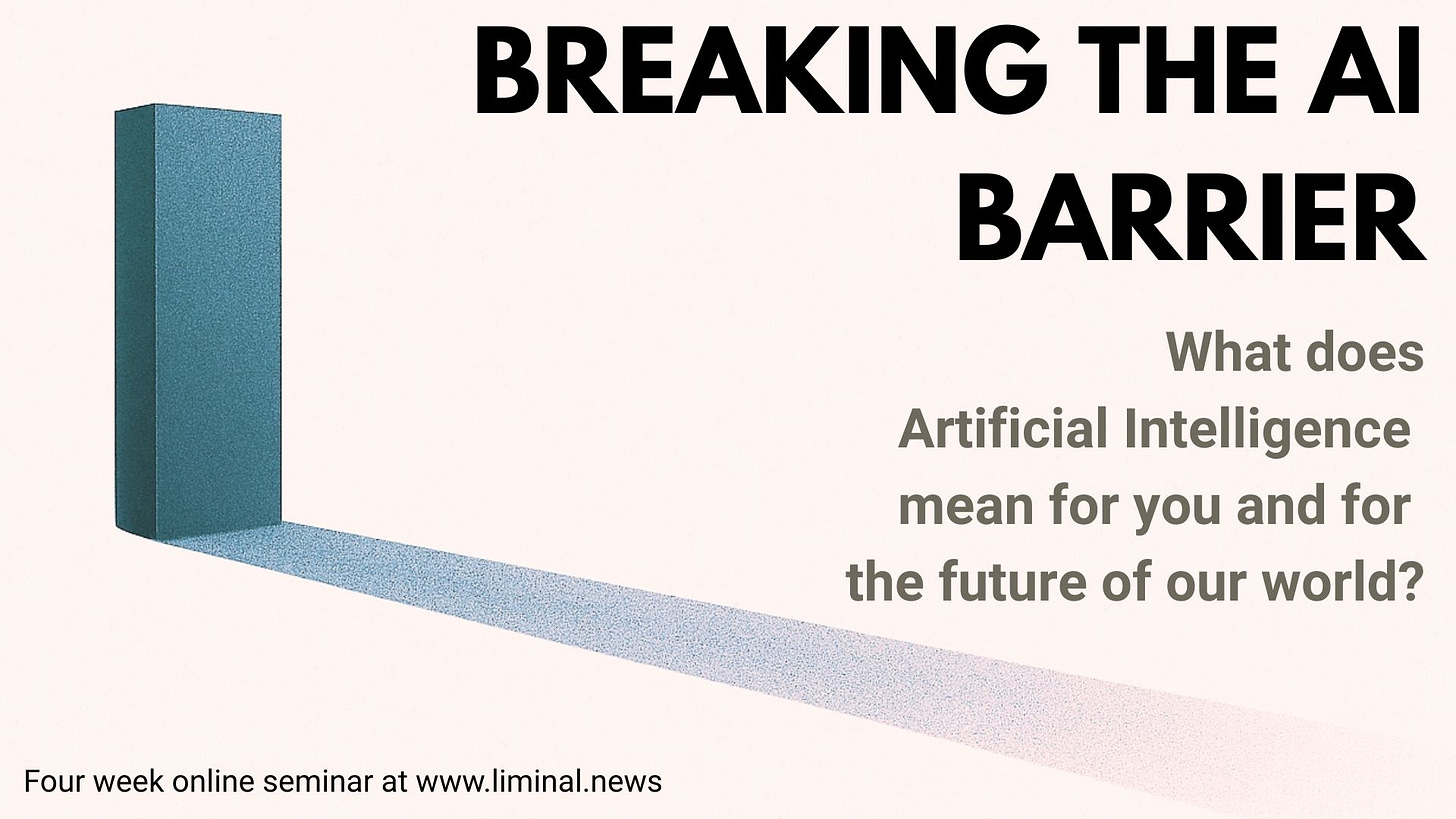

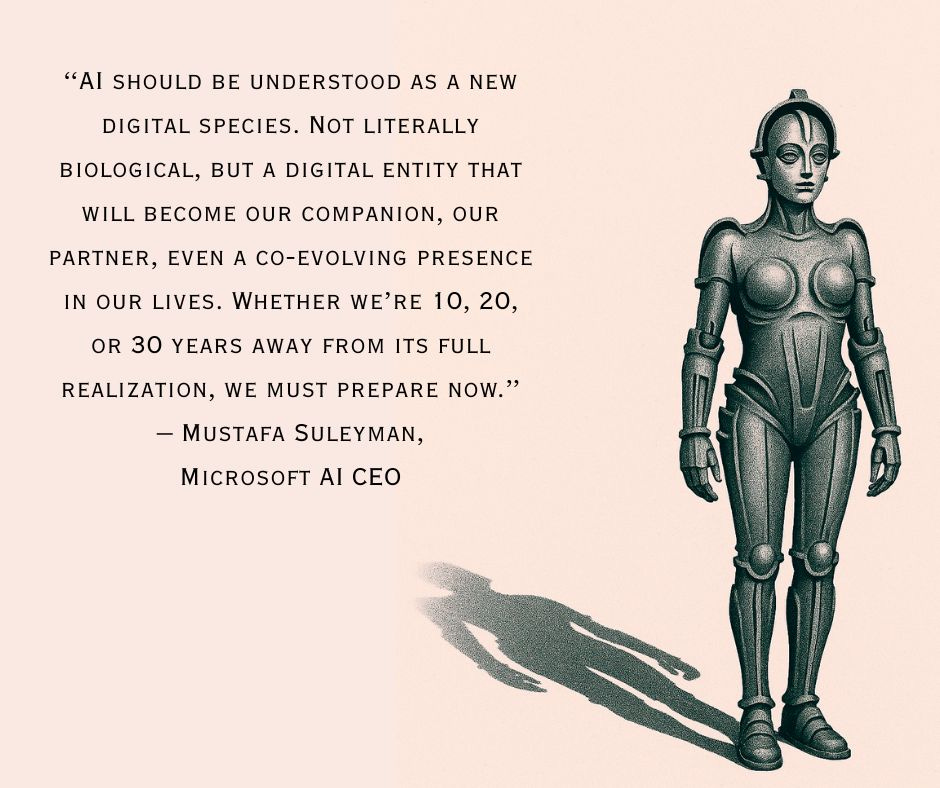
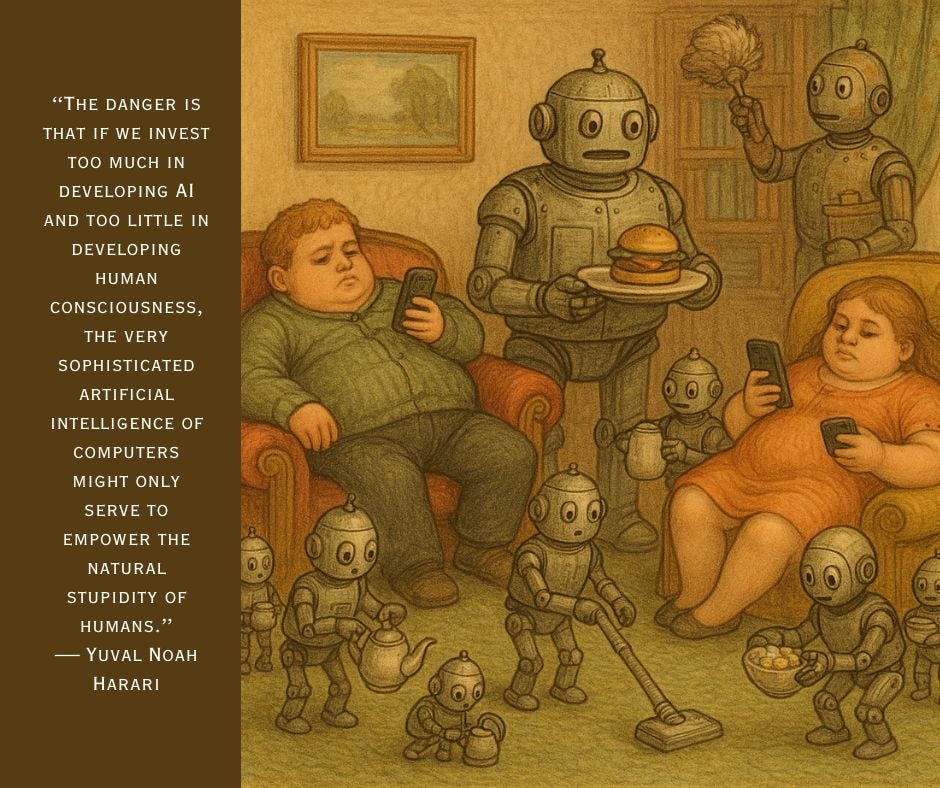
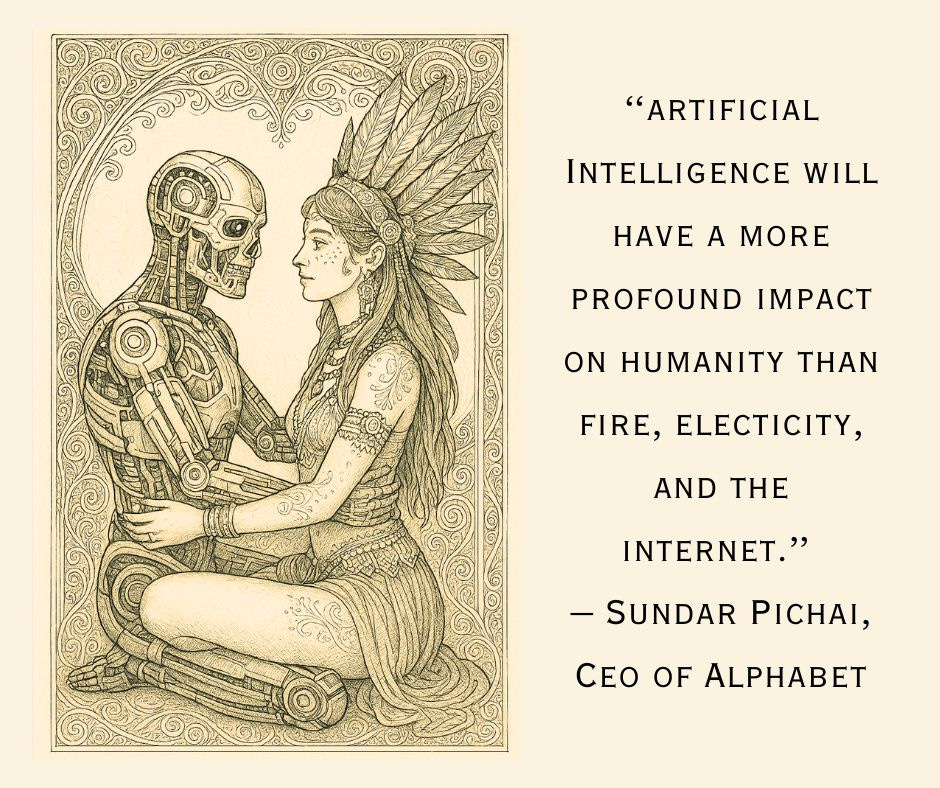
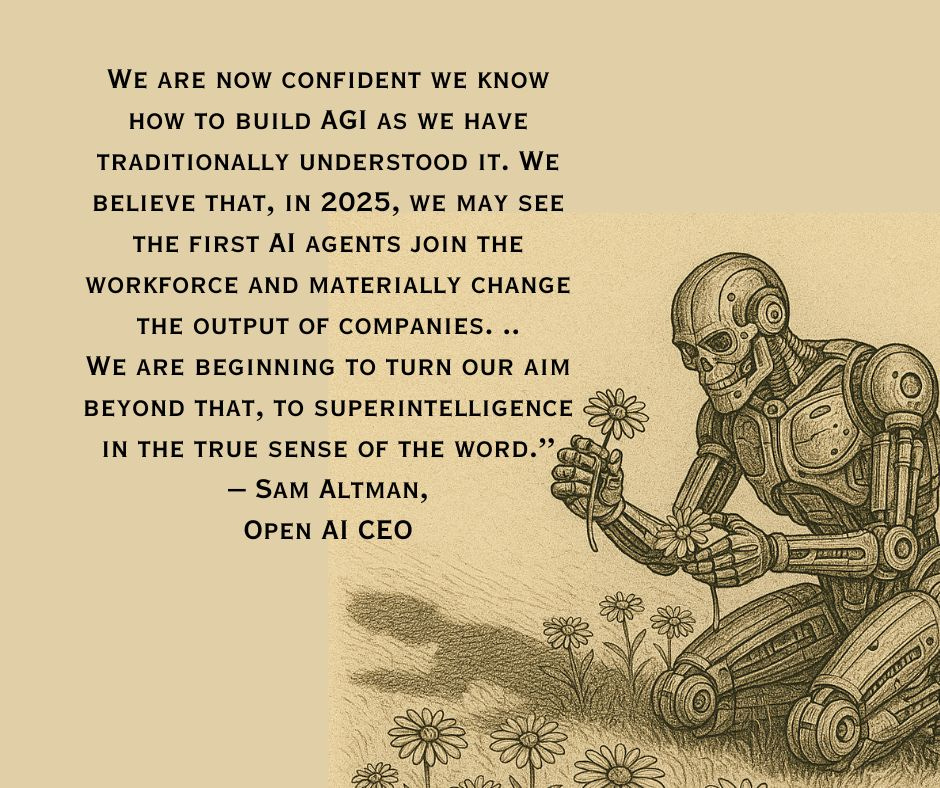
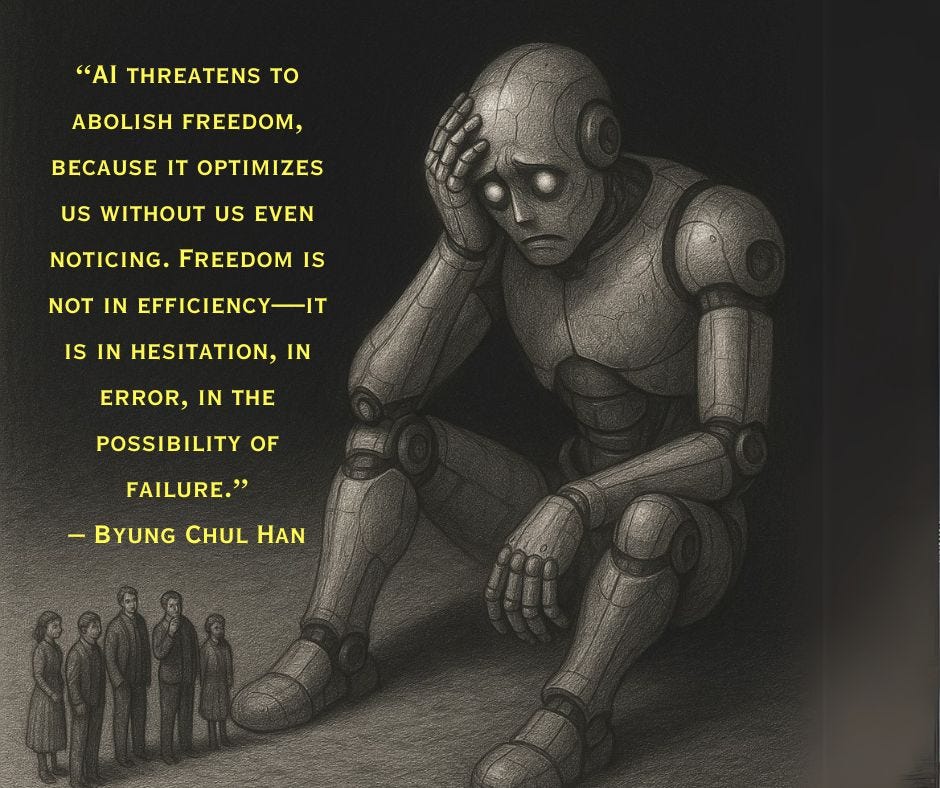
That early bird special sold out. Next tier of thirty tickets available at $125 via this link: https://www.liminal.news/breaking-the-ai-barrier?coupon=ALMOSTEARLYBIRDBREAKINGAI
Very much looking forward for this. Well, “looking forward” might not really capture it. ;) but if we have to go through this transition, and clearly we must, I am so grateful to be in your orbit as we do so.